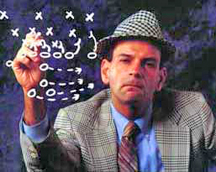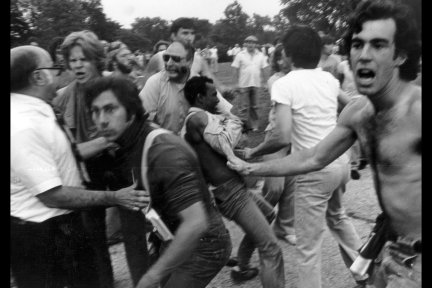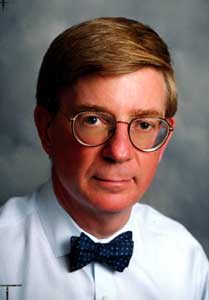The process was an arduous one: a series of satellite phone calls, a dead drop at a barren bus station in Albany, Georgia, coded message sent by microburst transmitters across state lines...but finally after a long, blindfolded journey in the boot of a car to an anonymous safe house somewhere in the suburbs of Birmingham, we got in touch with Paul Finebaum, the agent provocateur of SEC sportswriters and host of a massively followed sports talk show on XM Radio. (For more on exactly who Paul Finebaum is if you don't know about him, and why Alabama fans sometimes try to flip his car over, the Library of Congress recommends that you check out Wikipedia's article on him, which includes mention of the book his friend Tommy Charles wrote about him, "I Hate Paul Finebaum: 303 Reasons Why You Should, Too.") We talked about living under the angry eye of Bama fans, why you shouldn't go to Garth Brooks shows, and about actual football matters later in the interview. Enjoy.
Orson: Do you find it unusual that your career in sportswriting led you to testifying in a trial?
Paul Finebaum: If you go back 25 years perhaps, Ive probably been in a courtroom more times than O.J. Simpson. Its been--almost from the beginningtrending in that direction. Ive had a number of lawsuits. Im kind of surprised when I dont get called now.

Finebaum in reporter's garb.
O: Was the Ronnie Cottrell case the most high profile, the one with the most at stake?
PF: Clearly, I think that thats true. We had a couple of trials in the 80s, and I was involved in a couple of cases in AlabamaIm actually on the fringe of one now involving a prominent former CEO who had an infamous trial, I dont know if you followed the case of Richard Scrushy
O: Oh, yeah, yeah.
PF: Theyve got a case against him, too. In terms of walking out of a courtroom and feeling like I just testified against Samuel Alito in front of the Senate Judiciary Committee, or talking about Clarence Thomas like I was the one who checked out the porn tapes for him, it was pretty amazing. There were about 80-90 cameras and 5-6-7 more reporters. It was pretty heady stuff for a lowly sportswriter. I could get used to it by the way. It would make me think that Id killed my wife or was running for president. Im not really sure which.
O: Or both.
PF: Theres been times when Ive thought about doing both.
O: You live in a particularly intense fishbowlAlabamawhere you cover the most popular sport in the state. While publicitys good, the intensity has to wear on you. How do you cope with that?
PF: It does. I take a lot of drugs, been in and out of rehab more than Courtney Love. Heres an interesting story: my wife was reading Warren St. Johns book, and she got to one of the chapters about what I went through, and she asked Did this really happen? Did these people try to turn your car over after the championship? My wife was shocked that people hate me this much, because I think that sometimes people think this is some big façade, that I play this role on the radio or in the newspaper and it really doesnt happen. It happens, and it can be kind of scary. You dont see me walking to a bar at 5 oclock on St. Patricks Day and saying Anybody wanna fight? You dont go looking for trouble when youre me. I dont mean to make myself as anything Im not, but Im recognized as someone people like to hate, so therefore you do have to be careful. I try not to get involved in pool games in places that are called Leftys Pool Hall. I try to be pretty careful, and when I go to Wal-Mart on Sundays I wear a Groucho Marx mask.
O: Give our readers you most recent example of fan contact of a non-pleasant or at the least disturbing variety.
PF: Usually, its particularly bad at the football games. You go down to the field and walk down on the field from endzone to the other, and the student section begins chanting Finebaum sucks and throwing things, all 5-10,000 of them. The worst experience I think Ive had in that regard came about 10-15 years ago at a game in Baton Rouge.
Alabama had clinched the SEC on a Saturday night down there. There were about 20,000 Alabama fans down there waitingBill Curry was the coach at the time, so thats sixteen years agoand they were waiting for him to come out of the tunnel chanting his name. I walked back out to go to the press box on the other side and someone called out my name and all 15-20 thousand start chanting Go to hell, Finebaum! Now that sounds funny, but at 11 oclock in Tiger Stadium? When you can imagine if you added up the drug alcohol level of those 15,000 combined you could blast a rocket to Jupiter from that spot? Ive been known to run to my car after a game. You dont want HEY! Thats Finebaum

Hey! That's Finebaum!
I know Im just kind of droning on, but there was an occasion a few years ago in Birmingham at a Garth Brooks concertdont ask me why, I was seriously depressed. (Laughs.) My wife wanted to go. You ever been to one of these concerts?
O: Oh, yeah. Ive been.
PF: The line outside the womens restroom is quite longer. (I havent quite understood this.) At one point they let the women start going into the mens restroom as well, with the women at the stalls and the men at the urinals. Im standing there with fifteen or twenty of my closest friends, and some woman who was coming out the other door saw me and recognized me and said, Hey, theres Paul Finebaum! I kid you not: sixteen guys turned their heads like it was some bad Chevy Chase movie. I was like, What do you do? You kind of try and avoid that. You try not to drink too much if youre going out in public.
Im not complaining. Its good to be recognized in public. You always love when a Hollywood star or a rock star is complaining about how hard it is, and a year after their last picture bombs theyre dying to have someone say hello or ask for their autograph. It comes with the territory and you embrace it as best you can.
O: Do you think you fell into that role, or do you think you just figured it out?
PF: Man, youre asking really intellectual questions for a sportswriter.
O: Blogger, not sportswriter.
PF: I think it evolved. It started at college at the University of Tennessee. I was controversial there as a columnist, and I quickly realized that at that point it hadnt happened very often. I kind of embraced it and I got reaction. In the earlier part of my career I was a serious journalistI was mainly an investigative reporterand as I moved into a role of a columnist and later a columnist and a talk show host, it became pretty obvious what worked and what didnt work. I think because there had been so little critical analysis in sports in this part of the country I gained a lot of attention as somewhat of a trailblazer. I was originally much more interested in the serious side of journalism, and still am doing it to a degree rather than being a circus clown.
O: Now you went to the University of Tennessee. When you were getting your sportswriting chopsand this doesnt just apply to journalistswhat writers or journalists did you look to in terms of style and technique?
PF: Its funny, there were several. As a kid growing up, Dan Jenkins was my favorite. What I liked about him was that he would write this long piece in Sports Illustrated about going to the Texas Oklahoma game or the Alabama Auburn game. He would maybe get the score in the last paragraph, but he would talk about the scene, hed talk about the people, and thats what fascinated me about college sports He was one of my favorites.
Lupica was someone as a college student and a young writer that I looked up to. Another guyI followed him when he was at the NY Times, and the Post, and now at ESPN, but Kornheiser was someone whose writing style I really admired.
O: Whos taken a similar career path to you.
PF: Well, maybe the difference of a few zeroes in our salaries, yeah. Now Ive gotten to know him a little bit and really admire him. More from a political standpoint, George Will was someone I read a lot. Not so much for the politics as for the writing style. I was more interested in politics than sports, and in many ways still am. Im fascinated by how sports and politics intertwine. Political columnists and sportswriters have always been where Ive looked, as well.

A role model for writing, if not fashion.
O: Speaking of writers you play a prominent role in Warren St. Johns Rammer Jammer Yellow Hammer. Do you think Warrens portrayal of you is accurate?
PF: Id really rather not comment considering that Im working on an 18 billion dollar lawsuit for ruining my good name. Yeah, I think he did a good job for someone who works at the New York Times. He, as Im sure you may know, I was reluctant to do it but he was so, I dont know if its Warrens personalityhes such an engaging personalityyou kind of forgot that he was around at times, which is the mark of a great journalist. I think he nailed it. He gave an interview in the Birmingham News in a piece on me last April, and I think his quote was that it was fairly disappointing to him to find that Finebaum wasnt this ogre that he wanted him to be. It was fun to read. Obviously, your eyebrows raise when you have that prominent a role in a book, but I think for the most part he came as close as anyone has done.
Hes cost me a lot of money, though. Ive probably given that book out a hundred times for Christmas.
O: Are you a fan anymore?
PF: Probably not. You really do kind of get worn out. There are times when you go to a game when you forget and enjoy the moment. For the most part, though, youre always thinking about the angle, and what it means, and what youre going to say and write. So its hard to just sit there and just watch the game and cheer and enjoy it. If theres a pitfall to the profession, thats it. Youre a fan of the big picture, but as far as sitting in front of the television set or in the stadium and enjoying it, probably not.
O: Done with the touchy-feely questions. Shulas contract extension: is this a sign of acceptance, or greater patience on the part of the Alabama football community, or is this just politics?
PF: I think its more politics than stability. I think the University of Alabama has put themselves in a corner. He was an interim coach when they hired him, they paid him an interim salary commensurate with the night manager at a KFC. After last season, they didnt have a choice. There wasnt an option: they had to pay him reasonable money. So its hard to answer the stability question because I did an article whereI looked it upif he loses to Auburn in November it will be the first time in Alabama history that a coach has lost four straight to Auburn. That goes all the way back to 1892. Now there was a forty year hiatus in the game, but thats still a long period, but you tell me: if he loses to Auburn, and thats the fifth straight loss to Auburn and fourth straight by Shula, how much is that contract worth?
Its one of those situations that reminds me of politics, where he loses in the primary and next week John McCains got his arm around George Bush. Theyre not against you; the university president and athletic director at Alabama have a lot invested in Mike Shulas success, so theyre hoping to shape the picture. The public right now, I think, is into him. In terms of politics, hes got good numbers. Those numbers will change, of course, if he cant continue the success.
Good numbers. Bad hand placement.
O: Given 10-2 last year, is there any chance this year wont be a letdown for Alabama?
PF: I think it will be a letdown for Alabama. I think last year was a magical year in many respects. Its always easier to exceed expectations. A lot were reporting on the national scene that Alabama had the potential for a good season. Every one of them offered the following caveat: if Brodie Croyle doesnt get hurt. If you could have assured me that Brodie Croyle doesnt sustain a single serious injury the entire season and would be playing in the bowl game, the prediction would have been significantly higher. Did we know Tennessee was going to be a losing team? Those are some little bitty things there.
The two swing games were Tennessee and Florida (I thought theyd lose to LSU and Auburn before the season.) Florida was a little hard to get your handle on it was a favorable schedule. Im not taking anything awayit was a senior team, and they clickedbut 10-2 was a fortunate result.
O: Moving on that: did you ever think Tommy Tuberville would have anything close to the status of elder statesman of coaching at Alabama?
PF: No, I really didnt. Tubervilles one of those guys you thought would either blow out or get out as soon as he could. Ive always liked him and thought he had the potential to be a really good coach, but hes always had this little black hole around him and as soon as he could, hed manage to step on a mine and blow it all up. Somehow, the best thing that ever happened to him was almost getting fired. Hes been a little different since then. It obviously played a big role in his perfect season, and it was kind of a wake up call. Hes a fantastic coach: thats the story. Everyone fawning over Alabama last year, but what hes starting to do at Auburn 9-3 is a letdown for some, but after a 13-0 season to win nine games in the following season is a nice second act.
O: And beating his rival, too.
PF: You can argue whatever you want about the state of the Alabama football program, but hes 5-2 against his rival. He also has a winning record against most everyone else, too. Hes done well against Georgia, hes done well against LSU, and those are critical aspects of his resume. As for Shulas resume, he doesnt have a whole lot to stand on besides enough wins to be governor of Mississippi. He pretty much owns that state.
O: He does have that one win against Florida, though.
PF: Yeah, I agree, but hes not going to beat them this year.
O: Thats what were hoping.
PF: Look, theres one guarantee on the 2006 schedule: I cant tell you about the Auburn game, I cant tell you about the Tennessee game, but I can tell you that Urban Meyer will not lose to Mike Shula again.
O: What do you think of Meyer? He hasnt shown his hand a lot. Were intense Meyer-watchers, and from what we gather hes an extremely intense, and an extremely private person. We know Florida will have a winning record, but other than that we know little about him.
PF: I think its difficult, to be honest. I like him; I dont know him, but I like him from what I see. Im just impressed with his recruiting. I think it says a lot about a coach to be that dogged in his pursuit of players. I really think hell be successful. You know more about the Florida scene than I do, but that is not the easiest place to enjoy success.
O: Its really not. Its an unusual environment, and I dont think very many people have their finger on it.
PF: Most of my understanding comes from a long relationship with Spurrier, and what they did to him. I was close with Zook, too. Thats a tough place. I think hes done pretty well. To be able to survive the absolute thrashing by Alabama and then to lose to South Carolina and to turn that .the Georgia win seemed somewhat tainted
O: Fluky.
PF: To beat even a down Florida State team gave him the juice to go into the bowl game. I think people are upbeat on him, and it could have been a disastrous first season. I think he is going to be a terror in this league.
O: Going back to that: is your job a little easier with Spurrier back?
PF: Well, its not quite as enjoyable with him at South Carolinait was more fun when he was at Floridabut its nice to have him around. I will say this: we all try to be objective, we try to say we dont care who wins. But I found myself sneaking over in the press box last year to peek at South Carolina and whoever they were playing. I think I missed a whole game while I was watching the end of one of their games. I never understood the whole hatred of Spurrier when he was at Florida; I think that was a whole big act and Spurrier was the master of it. I was thrilled to see him do well. Usually you dont care, but I do care about him.
O: He runs a clean program, too.
PF: Listen, I dont want to bore you with Spurrier stories
O: You couldnt.
PF: Playing golf with him
Golf is a game for cheaters. You can shoot a thousand times during a golf round. Spurrier doesnt tolerate it. Hes played with some prominent people, and hell tell you, I cant believe what this guy did, or how he cheated, or when he did this
Part of you is saying, Does anyone care this much about a golf round, and a part of you really has to respect the guy. If you care this much about the rules of a golf game, youll care that much about what you do for a living, and he does. Ive had many discussions with him about other schools, and hes very honest about it. He usually, from my experiences with him, goes directly to the athletic director and says, Ive been told youve done this. As opposed to being a tattletale or Inspector Clouseau like Phil Fulmer. I respect that a lot
Spurrier and Finebaum, seen here in a notoriously Spurrier-friendly environment.
O: Going to Fulmer: is this next season it?
PF: That is the best story in the SEC this year. I dont know a lot of my friends up there are saying that this is a program ready to implode, but if you look at last year, this wasnt a disastrous season in the sense that they came out and got blown away. They beat LSU, probably the best team in the SEC. Theyre a fumble on the goal line away from beating Alabama. The Vanderbilt game, the season was over by that point. I have a hard time believing hes finished. If I have to give a strong opinion here, which sportswriters dont like to do, I think hell make it back. That program is not in as bad a shape as most people think it is. I believe hes a good ball coach, and that David Cutcliffes a good coach, too. When youve been on top as long as he has, youre going to hit a bump in the road. It just hasnt happened to him.
O: They havent even made an appearance in the Fulmer Cup yet.
PF: I saw that the other day. That was pretty funny. I really .by the way, I dont like him. This isnt a friend of mine Im trying to elevate here. Dont count Phillip Fulmer out. Im amazed at how quick fans turned on him. We were talking about coaching combinations the other day. Somebody called in, and I said that Tennessee may have one of the best basketball/football combinations around. The caller asked, Youd take Phillip Fulmer and Bruce Pearl over Mike Shula and Mark Gottfried? I said, Yeeeeeah? And he answered, Did you see what happened last season? And thats kind of the world we live in. You forget that the guy has one of the best resumes in college football coaching history. You saw that on the recruiting trail. Players cant see past that, and in the fishbowl of Knoxville another year like that and hes done.
O: Finishing up here we always wrap up with the same questions. What was the last book you read?
PF: I read three or four at once, hold on Prince of Fire, by Daniel Silvia.
O: If theyre making the movie of your life, what actor plays you?
PF: Obviously, I would prefer Brad Pitt. But unfortunately, its probably Ben Kingsley. Funny story, and stop me if this sounds too self-promoting. 60 Minutes came down and did something on Richard Scrushy, and Mike Wallace leans in and says, Did anyone ever tell you look like Ben Kingsley in Gandhi? I really dont want that on my resume.
All set to play Finebaum. They're just working on the numbers.
O: You really want more the Ben Kingsley from Sexy Beast. Final question: if you were a fight with a bobcat, who wins?
PF: Me.
